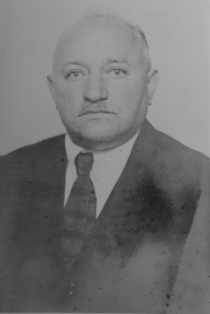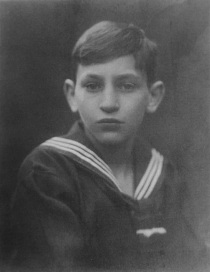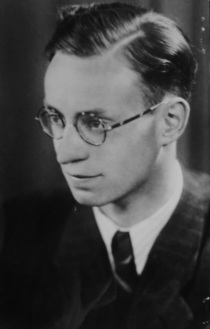Aronade family - Laying location: Clara-Zetkin-Straße 5
Dr Berthold Aronade (1871-1938)
Persecuted as "Jewish"
Stumbling stone inscription:
HERE LIVED
DR. BERTHOLD
ARONADE
JG. 1871
HUMILIATED / DISENFRANCHISED
DEAD 20 MARCH 1938
DRESDEN
Berthold Aronade was born on 4 January 1871 in Antonienhütte (district of Katowice, Upper Silesia) as the son of the merchant and private trader Aron Aronade and his wife Rosalie, née Becker. He had a brother, Otto Aronade (born 1881), who later worked as a doctor.
Berthold Aronade attended grammar school in Groß-Strehlitz and then studied law in Munich, Berlin, Zurich and Breslau. In 1897/98, he completed his doctorate at the Friedrich Schiller University in Jena with a dissertation on Jesuit law. During his studies, he was registered in Berlin.
On 16 May 1907, he married Katharina Sachs in Hirschberg. The couple had two sons, Günther and Kurt. During a period of increasing political anti-Semitism, Aronade supported the election fund of the Central Association of German Citizens of the Jewish Faith in 1911.
Aronade served as a soldier in the First World War and was severely wounded in November 1914 as a deputy sergeant in the Kattowitz Landsturm battalion.
After the war and the Polish occupation of Upper Silesia, the family left their homeland. From 4 November 1920, they lived in Radebeul at Sedanstraße 5 (now Clara-Zetkin-Straße). Berthold Aronade is listed in the address book as a merchant. In 1921, he joined the company Theodor Aust oHG in Dresden as a personally liable partner, a wholesaler for hardware and business supplies.
During the global economic crisis (1929-1931), Aronade was appointed as a confidential counsellor in several proceedings. Little is known about the family's experience of the seizure of power in 1933, but it is certain that the Aronades were also increasingly affected by marginalisation and persecution.
Berthold Aronade used his legal and business expertise to help other Jewish emigrants with property, tax and land issues. As a recognised front-line fighter in the First World War, he was initially spared certain anti-Semitic restrictions and was allowed to continue representing clients before tax authorities and local courts.
In the mid-1930s, the couple moved to Dresden in the face of increasing repression. In 1938, they lived at Schneebergstraße 25 near the Großer Garten. In the Dresden address book, Berthold Aronade is listed as a "business consultant".
On 20 March 1938, Berthold Aronade died in the Dresden-Löbtau city hospital at the age of 66. He was laid to rest in the New Israelite Cemetery in Dresden.
Text and picture: D. Ristau
Katharina Henriette Aronade, née Sachs (1883-1943)
Persecuted as "Jewish"
Stumbling stone inscription:
HERE LIVED
KATHARINA
ARONADE
DEV. SACHS
BORN. 1883
INTERNED 1942
CAMP HELLERBERG
DEPORTED 1943
AUSCHWITZ
MURDERED 3 MARCH 1943
Katharina Henriette Aronade, known as "Käthe", was born on 24 July 1883 in Hirschberg (now Poland), the daughter of factory owner Eugen Sachs and his wife Anna. Until her marriage, she lived in her hometown and presumably attended school there.
In 1907, she married Berthold Aronade and moved with him to Radebeul after the First World War. There she was initially a housewife and took care of the upbringing of their sons Kurt and Günther. During the Great Depression, Katharina Aronade ran her own textile business, which she presumably gave up again in 1934/35 under the pressure of increasing anti-Semitic persecution. Shortly afterwards, the family moved to Dresden.
After the death of her husband in 1938, Katharina Aronade gave up the flat in Schneebergstraße. In 1939, she initially lived in the household of Mathilde Krumbiegel, who was also persecuted, at Lindenstraße 26, later she was registered at Mozartstraße 3 and finally at Schillingstraße 19.
There are references to her situation during this time in Victor Klemperer's diaries: in August 1941, Katharina Aronade was summoned to the Gestapo because she had bought a watch bracelet, where she was "foully treated and beaten" so that she was "ill for two days". Klemperer also described her physical decline - the formerly corpulent woman was "completely emaciated, absolutely scrawny", but still retained her courage and confidence. Medical documents confirm that she suffered from heart and nerve problems as well as a walking disability as a result of the persecution.
From 1942, Katharina Aronade was forced to live in a so-called "Jews' house" at Altenzeller Straße 41. There she was socially isolated and subjected to further harassment.
On 24 November 1942, she was forcibly transferred to the "Hellerberg Jewish camp" in the north of Dresden - a forced labour camp run by the Zeiss-Ikon company. A film shows her suitcase, on which the compulsory first name "Sara" was written.
On 2 March 1943, Katharina Aronade was deported together with the other camp inmates from the Dresden-Neustadt freight depot to Auschwitz, where she was murdered immediately upon arrival on 3 March 1943.
Text and picture: D. Ristau
Kurt Aronade (1915-1993)
Persecuted as "Jewish"
Stumbling stone inscription:
HERE LIVED
KURT ARONADE
JG. 1915
FLEW 1939
DENMARK
SWEDEN
Kurt Walter Aronade was born in Katowice on 27 January 1915, the son of Berthold and Katharina Aronade. After the family moved to Radebeul, he attended the Schiller School from 1921 to 1925 and then the Realgymnasium in Lößnitz, from which he graduated with a secondary school leaving certificate. He celebrated his bar mitzvah on 31 August 1929.
Despite increasing anti-Semitic discrimination, Kurt Aronade was able to successfully pass his journeyman's examination as a heating fitter and a welder's examination in 1936. He was actively involved in Dresden's Jewish community, particularly in the youth training centre, where he gave lectures and helped organise events.
After the November pogroms in 1938, Kurt Aronade was deported to Buchenwald concentration camp and was only released on 22 December 1938. In March 1939, he emigrated to the Netherlands, presumably together with his brother Günther.
During the Second World War, Kurt Aronade initially stayed in Denmark, but fled to Sweden after the German occupation in 1940. There he lived in Björskog and worked as a labourer in 1944. In the same year, his daughter Ruth was born, his daughter with Susi Gabriele Wergert.
Kurt Aronade was the only one of his family to survive the Shoah. He emigrated to Israel with his family in 1949. He died on 16 January 1993 in Netanya, where he was laid to rest.
Text and picture: D. Ristau
Günther Aronade (1918-1944)
Persecuted as "Jewish"
Stumbling stone inscription:
HERE LIVED
GÜNTHER
ARONADE
JG. 1918
'PROTECTIVE CUSTODY' 1938
BUCHENWALD CONCENTRATION CAMP
ESCAPE 1939 HOLLAND
INTERNED IN WESTERBORK
DEPORTED 1944
AUSCHWITZ
MURDERED
Günther Ernst Aronade was born in Katowice on 19 March 1918. Like his brother Kurt, he attended school in Radebeul. He celebrated his bar mitzvah on 28 March 1931.
A talented table tennis player, Aronade initially belonged to the Radebeul ball games club. After the exclusion of Jews from general clubs, he joined the Jewish sports club Schild Dresden. In 1938, he became Württemberg champion in a tournament of Jewish sports clubs.
Around 1938, he lived in Heidelberg, presumably to study interpreting. During the November pogroms, Günther Aronade was deported to Buchenwald concentration camp and only released on 27 January 1939. Shortly afterwards, he left Germany and emigrated to the Netherlands. From 8 March 1939, he lived in the Werkdorp Wieringen, a training centre for Jewish emigrants to Palestine. After the Werkdorp was closed in 1941, Aronade moved to Amsterdam. There he married Elsa Heymann in July 1942. Among other things, he worked as a stoker for the Amsterdam Jewish Council set up by the German occupying authorities.
Günther Aronade was arrested on 20 June 1943 and taken to the Westerbork camp. He managed to escape in September 1943. However, when he and his wife tried to reach the unoccupied south of France, they were caught and sent to Moulins prison. Günther Aronade was then transferred to the Drancy camp. On 10 February 1944, he was deported from there to Auschwitz. There he was classified as fit for work, given a tattooed prisoner number and forced to perform forced labour. He contracted typhus in the camp. The exact date and circumstances of his death are unknown.
His wife Elsa Aronade survived the Holocaust, emigrated to Israel and later campaigned for the memory of Günther Aronade.
Text and picture: D. Ristau







